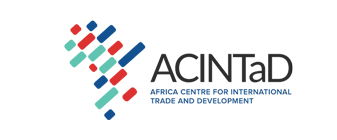
Strong Institutions and infrastructure needed for implementation of African Continental Free Trade Area – ACINTAD
July 23, 2019
African governments need to ratify the protocol on free movement of people
November 25, 2019The AfCFTA is expected to boost intra-African trade by 33% once full tariff liberalization is implemented, attracting additional intra-African investments and creating market opportunities to foster Africa’s industrialization through regional value chains, according to a report by UNCTAD. If implemented successfully, the AfCFTA has a potential of generating $6.5 trillion by 2030. However, lack of adequate capacity is a major threat to the successful implementation of the AfCFTA.
For the AfCFTA to be implemented successfully in Ghana, the government must address these capacity constraints:
- Knowledge: One of the major reasons why Africa has not benefited from multilateral trade for many decades is due to lack of adequate professionals in Trade Law and Trade Policy. There is the need for capacity building in these areas. We need more trade lawyers and trade policy analysts in the country to support with trade negotiations at various levels.
- Institutional strengthening: Our institutions are very weak and it makes implementation of signed and ratified agreements very challenging. For Ghana to successfully implement the AfCFTA, we must strengthen the relevant MDAs and allow them to function effectively without any political interferences. This is very crucial because institutions help to create the needed enabling environment for trade to happen quickly.
- Infrastructure: The country’s infrastructure capacity is very low and it will serve an impediment for the smooth implementation of Trade Facilitation measures. There is the need for a massive investment in infrastructure to build more and also strengthen already existing infrastructure to withstand the pressures that an open economic market will have on the country. Especially, since Ghana is hosting the AfCFTA Secretariat.
- Private Sector and CSOs Capacity is Limited: Unfortunately, no preliminary study was done to ascertain the potential impact of the AfCFTA on the private sector in Ghana, hence making it very vulnerable to competition within the continental single market. Private sector professionals must update their knowledge in the various aspects of trade law and trade policy in order to understand the potential impact of trade agreements on their businesses. Civil society’s role in trade policy making is very important to ensure equity and fairness and be able to hold government accountable. Hence, civil society
leaders must also develop their capacity in understanding how trade policy can benefit the people they serve.
Addressing these various capacity gaps will go a long way in making Ghana and in a broad sense Africa ready for intra trade that serves a tool in the sustainable development agenda.
Isaac Hubert Arthur
Executive Director
ACINTaD
Read more via GNA website




